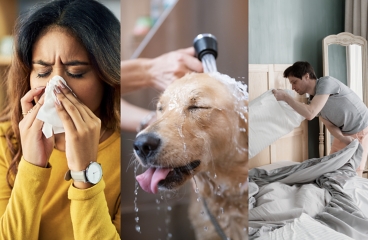Tips for Reducing Indoor Pollutants in Your Home
Overview

Exposure to indoor air pollutants can cause respiratory problems, such as asthma attacks. It can also cause diseases, such as lung cancer. Pollutants include smoke, pet dander, radon, mold, cleaning products, and other chemicals. You can create a healthier home by following the tips below.
- Reduce allergens.
- If pets make allergy or asthma symptoms worse, avoid having pets or keep them outside. If that's not possible, don't let them in the rooms where anyone who has asthma or allergies sleeps. Wash dogs often.
- Keep your home clean and dry. Wash bedding in hot water, store food and trash in closed containers, and vacuum often. Use HEPA filters in your vacuum and air filters, and clean or replace them regularly. And choose window coverings that are easy to clean, such as wood shades or blinds.
- Don't allow anyone to smoke in your home.
- Control moisture.
- Fix leaks and other sources of moisture. Remove water-damaged materials.
- Make sure your clothes dryer vents to the outside.
- Use an exhaust fan in your kitchen, and keep it clean. Use the bathroom exhaust fan or open a window when you shower, if possible. Make sure bathroom exhaust fans pull air outdoors and not into basements, crawl spaces, or inside the house.
- Keep outdoor gutters and drains clean to prevent water from building up and creating moisture inside.
- Avoid problems from heat sources.
- Get furnaces, hot water heaters, and gas ranges checked every year. Make sure that the air intake and exhaust systems are adequate. And clean and seal duct systems.
- Don't use kerosene space heaters or unvented gas heaters as your primary source of heat. Also don't use charcoal grills or portable camping stoves inside.
- Install a carbon monoxide detector in your home.
- Make sure wood stoves and fireplaces have tight-fitting doors. Get flues and chimneys checked and cleaned. Don't store firewood indoors.
- Check household furnishings.
- When shopping for new furniture or cabinets, try to avoid particleboard since it may contain irritating chemicals that give off gases and odors. Reduce furniture with fabric. When possible, replace it with leather, vinyl, or wood.
- If possible, replace carpet with hard flooring. If that's not an option, choose carpet with a short nap, or use area rugs that can be cleaned often. Start with the rooms you spend the most time in.
- Call an expert if you have to remove lead paint. Do not sand or strip off the lead paint.
- Be careful with household products.
- Take care when using cleaning products, paints, solvents, and pesticides. Try to use them outside. If you must use them inside, open windows or use a fan to blow odors and fumes out of your home. Paint can release gases for months after you apply it. Try to use paint without volatile organic compounds (VOCs).
- Do not mix cleaning products. Follow the directions on the bottle. Consider using safer cleaners such as soap and water or baking soda. A vinegar and water mix can be used to clean glass. Try to choose unscented and nonaerosol products.
- Avoid using chemical air fresheners and deodorizers.
Credits
Current as of: October 24, 2023
Current as of: October 24, 2023